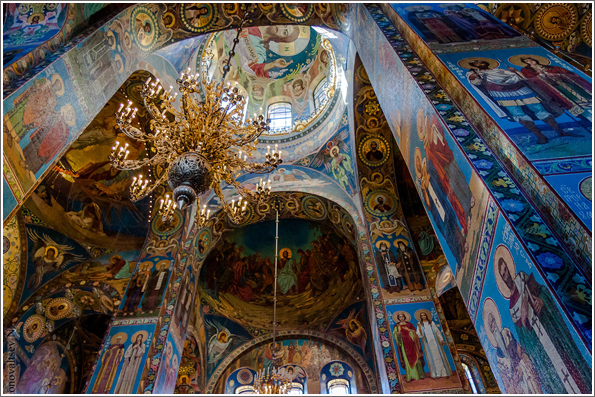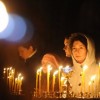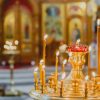In the name of the Father and of the Son and of the Holy Spirit, amen. Amen.
As you see through the image of the cross in the middle of the church decorated with the basil and the roses that we are still celebrating the Feast of the Exaltation of the Cross, that glorious event of finding the cross for the first time ever by the new Christian community freed from persecution by Saint Constantine in the early 300s.
We want to focus on, at this time of the year, the reality that Christ has given to us that if we are to come after Him, if we want to be one of His followers, if we want to call ourselves a Christian, if we want to pursue Him, hunt Him down, take Him captive, in a sense, catch up with Him and make Him our own, we have to deny ourselves, not our true self, not the Christian self that we become, not the authentic self that is created in the image of the Holy Trinity, but that false self that we all have, that broken self, that self that is made out of misconceptions about our self, our neighbor, and God, misconceptions about who we are.
Lies, really, about ourselves that we have heard from people, from other broken people, perhaps from the demons, that that broken self thinks that if it gets its own way, it will be happy, which is just this phenomenal experience as Christians where we go after our own will, we go after what we want, what we’re sure that we have a plan that is going to make us happy. The only thing that we experience, really, in the end is that we’re very capable, very capable of disappointing ourselves, aren’t we?
Saint Theophan has this wonderful exhortation to the people that he just says: “If you want to see how weak we really are as Christians, how much we have to have Christ in us, we have to be empowered by the Holy Spirit in order to accomplish anything.” He said, “Just go make a plan for living the perfect life.”
We can all do it. It’s actually really easy. A lot of us have done it before, haven’t we? Get up at this time every day, exercise vigorously, eat right, be kind to everyone, be thankful for my job every day, never give in to a bad mood or a bad thought. I mean, we make bumper stickers that even tell us how to live right. It’s not super complicated. It really isn’t.
Even the world knows how to make a good life. The world knows that if everyone would just stop fighting, we would have universal peace. That’s a reality, right? That’s not delusion. It’s actually technically true. If no one would give in to anger, if no one would pick up arms against his neighbor, there wouldn’t be any war, there wouldn’t be any fighting, there wouldn’t be any murders or crimes. The world would have peace instantaneously. Why in the world can we not just accept that reality and choose it? Not for a day, not for a week or a month, but for the rest of our lives.
Saint Theophan himself, this great teacher, great ascetic says, “Just try. Make a plan for your life. Make a perfect plan.” In fact, in the bookstore, we have a wonderful little book called How to Live a Holy Life; a lot of you have it. He said, “Then just try to do it. Not for an hour, not for a day, not for a week, not for a month, but the rest of your life. It’s impossible,” he says. This great saint, “It’s impossible.” Can’t do it of our own will, we can’t, we are too subject to the passions.
One of the things we have to realize, really, not just know up in our heads, but bring down into the way that we live day to day and make decisions and make commitments and fulfill them and go forward with our plan, our spiritual goals and our mission and vision as a church, we have to accept deeply that we can’t succeed without Christ in our life and the Holy Spirit empowering us. We can’t. We’ve proven it as the human race over and over again.
When we look at the entire history of the Old Testament, we see God Himself giving the people a set of rules that if they keep them, they will reverse the effects of the fall and regain righteousness universally. Two people do it: John the Baptist and the Mother of God. No one else, not the great prophets, not the great righteous, not the great kings and leaders of Israel, not Moses himself. These great saints that we have even depicted in the icons in our church, none of them did it, they could not read the rules and keep them perfectly. They couldn’t.
We have to accept that if we are going to go into this next year and grow spiritually, we have to be going after Christ and He tells us plainly several things. He tells us: “If you love me, keep my commandments.” We’re trying to do that all the time. Love is fairly dynamic, though, we know that as human beings, that love is pretty dynamic. Sometimes I have really intense love, sometimes it wanes, sometimes it’s a little self-centered, sometimes it’s unconditional. In a way, I think it is appropriate. When we look at striving to keep the commands, we see that it’s this dynamic relationship.
There are mornings when we get up and we are absolutely devoted, just on fire to keep the commandments of God and we have this incredible spiritual experiences and two days later, we wake up or act out, “I’m done with that.” Right? “I miss my old sins.” Father Alexey Young would call it “affection for sin.” When we let go of a sin long enough, we get lonely, right? It used to be this companion that kept us company all of the time and we’re missing it, even though we know it’s wrong.
Our keeping in with the commandments is a very dynamic relationship. We’re never going to achieve it by just gritting our teeth and doing what’s right. It won’t work. We can’t do it long enough. We can’t persevere in that kind of perfection.
When Christ says, “When you want to come after Me,” He is giving us, it’s not bad news, it’s the recipe for spiritual success. The first thing that we have to do is we have to start denying that part of ourselves, that broken, fallen part that thinks that if we’re in charge, everything will be good. Right? That’s the ego. We all know what that’s like; we’re on the inside. It’s just, “Dang it. If everyone would just do what I told them to do, everything would be great,” right? Don’t we feel that way about our spouse sometimes? Our children? Our boss? “If the whole world just worked like me, everything would be wonderful.” That’s creating reality in our own image, creating God in our own image, envisioning Him in our own image rather than seeing ourselves in His image.
There’s this incredible mystery that when we start letting go of our own will, we start being calm, we start accepting what comes along, we start realizing that there’s this incredible power that we can have by submitting to the circumstances around us in peace, looking for God’s will. That calming of the ego, of the self, more than anything, it creates the opportunity for us to hear God and let Him work in our life. If we don’t start pausing in doing our will, the opportunity is not there to hear or to see God’s will instead of our own. It’s just not there.
One of the crosses we have to pick up is denying ourselves. We have to deny ourselves, pick up our cross, and go after Christ. There’s going to be a lot of crosses in life. We’re going to have a very particular one for our self, but one of those crosses is we have to deny our self. It’s painful. We don’t want to let go of our own way, our own ego.
Yet when we look at God’s exhortation to us, if we don’t deny our self and pick up our cross, we can’t go after Him. We can’t go after Him. Denying our own will is what opens the door for doing His will. We can’t be doing them both. You can’t simultaneously do the will of God and your own will. It just doesn’t work.
The cross may seem scary and heavy and bloody and sacrificial in the beginning. In the end we realize it’s the key to the kingdom. We can’t get in without it. It’s what identifies us as a Christian. It’s what allows us to, as Saint Paul says, “be crucified with Christ, that we might arise with Him as well, that we might die to ourselves.” So that what? So that we’re just lonely and worm-like all the time? No, so that Christ would live in us.
As scary as it seems to let go of the self, there is nothing better than Christ dwelling inside of us. There is no greater joy. There is no greater satisfaction. There is no greater courage and commitment and confidence in life than to be in union with God and be doing His will. He’s the ruler of the universe. It’s actually very awesome.
The saints, all of them, could have denied God at any time. They had the free will to reject him or to sin again. One of the things we forget about the lives of the saints is being in union with God is so incredibly wonderful no one wants to not do it anymore once they experience it.
I tell the young people that there really is a choice there. The saints could choose to start sinning again and reject God, but it’s like somebody offering you a handful of mud and a handful of gold. You’ve got a choice. You really can choose the mud if you want, but I don’t think anybody really would. The saints love being there.
On September 29, we celebrated the memory of the Great Martyr Euphemia, this great saint, one of thousands of martyrs in the first few centuries of the Church. In a certain sense, just another young woman killed by those who are persecuting the Christians. In a sense, her story is very common. In the time of the persecution of the Church before Saint Constantine freed the Church, the Christians were all being ordered to worship the pagan gods. They’re all being told Christianity is illegal: “You cannot gather.” It was illegal to be a Christian. If you were caught praying, you went to jail. If you had an icon or a cross, you went to jail.
If you just went to jail and they would extort your family for money, that was the easy way off. If they took you to jail and they really wanted you to convert to the pagan gods, they would torture you by every man manner conceivable to get you to break. They did not want to kill you. They wanted you to break and to give up your faith in God.
Saint Euphemia was, on one level, just one of thousands of martyrs in the early centuries. She was a young woman, probably a teenager. In her area, a new law had come out that you had to worship, I think it was particularly the god Ares, and they refused to worship the god. She is famous for having this line where she says, “When the rules of the civil government support the goals and the vision, the mission of the Church, then you obey them. But when the rules of the civil government are against Christian life, you not only resist them, but you actively break them.” We should think about that when we look at the laws of our own country. There is a place as Christians for civil rebellion.
She’s taken and she’s tortured and it’s a very wonderful story. She’s put on the racks, she’s healed miraculously, she’s taken to the arena, the animals won’t eat her. They’re trying to torture her over and over again to get her to break. She won’t break. She gives up her life finally in glory and in faith and is honored as a Great Martyr in the Church, but at that point, she’s sort of like a lot of other martyrs of that era. A great cathedral is built for her.
A few hundred years later, I think she died right at the end of the 200s, right around 300 AD, in 451, you have the Council of Chalcedon. The council was held, hundreds of bishops coming there. They have a heresy to deal with and they gather in the Church of St. Euphemia, the Great Martyr, and her whole body is in a reliquary at the church like Saint Demetrios’s or Saint Sava or these others where they have the whole relics there.
At a certain point, the bishops are so divided as to the Orthodox teaching and the heretical teaching that is very strong and popular. They all agree we’re going to submit our decisions to Saint Euphemia. She’s the saint right here in the church, her relics are here.
The heretics write out their teaching about Christ, that He was not completely human and completely divine. He was mingled, he had this strange, mingled, pseudo-God/pseudo-man nature. The Orthodox teaching was, of course, that he was mystically, by the hypostatic union, fully God and fully man at the same time, and they write out their teachings. They open the casket, the reliquary of Saint Euphemia, and they put their teachings on her chest. She’s there with her arms crossed. They seal it and the emperor has the reliquary sealed with his seal. In those days, you mess with the seal of the emperor, you die. There’s guards set around it.
All of the bishops that are there, the heretics and the Orthodox, fast and pray for several days asking God to reveal the truth through his holy martyr, Euphemia, this young woman that all she did was deny herself and take up the cross. That’s all she did. She was not a great teacher, she wasn’t a great theologian, she wasn’t a great miracle worker. She just wouldn’t give up Christ when she was asked to, that’s all. She was very stubborn in her faith or very faithful.
They pray and fast for several days and then it comes time and the right people come and the seal is unbroken on the reliquary and they break the seal and they open up the casket and in her hand is the Orthodox teaching and the heretical teaching is under her feet. In some accounts, it says that when the patriarch went up to her relics that she actually handed him the Orthodox teaching. Lots of heretics changed their mind right then. Right then.
We celebrate her, this simple woman, young woman who gave up everything in order to simply follow Christ and not let anyone take Christ away from her, becomes this incredible illuminator of the Church, a defender of the Church from her casket after her death.
In that simple story, we need to be thinking about what God is doing with the good things that we happen to do by His grace, the good seeds that we actually pull off planting, the witness that we actually bear on behalf of Christ with some people at some time. What is He going to do with that? We won’t know until we are dead and united to Him as well what good He used us for as well.
Then in the 1980s, St. Euphemia works a great miracle again. Elder Paisios of the Holy Mountain, now St. Paisios of the Holy Mountain, the Church of Greece was having some big problems. All of these bishops were going to Elder Paisios to get his opinion on the problems. There were three particular problems that they wanted help with. Elder Paisios, in his writings, he says he couldn’t figure it out. He prayed and prayed and prayed and there seemed no solution whatsoever to the problems that they have.
He was praying then. He decided, “I’m going to pray to St. Euphemia. She helped the Church at one time figure out what was true. Maybe she’ll help me again.” He’s praying regularly to the Great Martyr Euphemia, she is the patron of our online school, by the way, because she is the teacher and the defender of the faith even though a very simple person. Elder Paisios is praying one night after praying to her for a significant amount of time and there’s a knock on the door. This is a recent saint, this is in the 1980s, he died in 1994. He goes to the door and nobody should be at his cell at this time of the night or whatever. He asks, “Who’s there?” She says, “Euphemia.” He says, “What, Euphemia?” She didn’t answer. He goes back to praying. I believe he actually crossed himself and asked for God to protect him from demonic delusion. There’s a knock on the door again. He goes to the door and he goes, “Who’s there?” She says, “Euphemia.” He opens the door and she’s standing there.
There’s a wonderful picture, an icon of this event in his life. She comes in and sits down with him and talks to him about the problems that the bishops of Greece are having. Through her counsel, he knows, he comes to great confidence what to tell the bishops. In the end, he does, and everything works out fine. She knew what she was talking about.
At the very end, he couldn’t help himself. When she first came into the room, though, he said, “You have to say ‘I worship the Father, Son, and the Holy Spirit.'” I forgot about that part. Because again, maybe it’s demonic delusion. She says, “Of course, I worship the Father, Son, the Holy Spirit. I’m with them in Heaven.”
They have this long talk and at the very end, he can’t help his curiosity and he says to the Great Martyr Euphemia, “Tell me the truth: Was it worth all the torture you went through to get to Heaven?” He wants to know. I think that’s very human, right? Mystical experience, saint appearing to him, answering all the questions I need to know. He’s still curious. I love that. He’s a real human being. “Was it worth it? Was it worth going through the tortures?”
She says to him, “Elder Paisios, Heaven is so incredible. There is no end to the tortures that I would have endured in order to be with Christ. If it had gone on for a thousand years, I would be happy that I went through it to experience what it is to be in the presence of God”, and with this wonderful exhortation of this active saint that we need to know if we don’t know her well, her icon is over here on the stand. We see that only good, only good comes from denying ourselves and taking up our cross and following Christ.
It is terrifying to look at the cross and think that we’re going to be hanging there somehow. What we do not know is the joy, the satisfaction, the reward of being united with God and being in His presence, even starting in this life with the indwelling of the grace of the Holy Spirit in us. We don’t know. When you don’t know yet what the reward is going to be like, the sacrifice is overwhelming, but we have to look to Christ, look to the Apostles, look to the saints, and remember that if it wasn’t worth it, they wouldn’t have done it. Even someone like Father Paisios, Elder Paisios of the Holy Mountain, he wants to know that it’s worth it and the answer is: Yes.
Through the prayers of our Great Martyr Euphemia, Lord Jesus Christ or God have mercy upon us and save us. Amen.

















